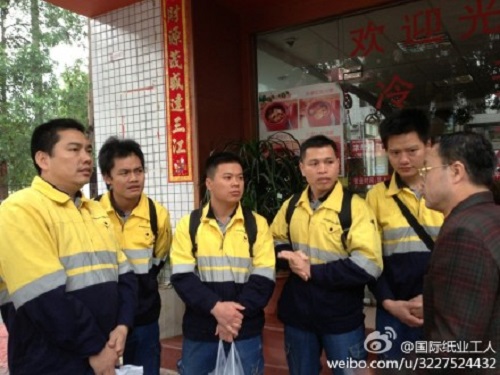Jennifer Cheung attends an arbitration hearing held in Guangzhou on the sacking of five employees at the Fortune 500 company International Paper after they staged a work to rule in protest at the company’s bonus offer.
“Don’t we have the right not to work overtime?” pointedly asked Shi Zhisheng during a six-hour arbitration hearing held in Guangzhou on 12 April.
Shi was one of five workers who had been sacked from American-owned International Paper after taking part in a work-to-rule on 21 February in protest at the significantly reduced annual bonus announced by the company that month.
Two days earlier, on 19 February, the entire workforce had gone out on strike in protest at the bonus offer with one worker saying his bonus had been cut to only 750 yuan, compared with 1,800 yuan the previous year. On the second day of the strike, regional managers came to the factory and spent three hours in the staff canteen trying to explain to the workers how the bonus was calculated. Management promised that no one would be punished if they went back to work on 21 February.
The workers were not happy with management’s explanation but returned to work anyway, fearing retaliation if they did not. However 17 employees decided to continue their protest by working to rule and refusing to do overtime. As the workers’ lawyer at the arbitration hearing Duan Yi said: “The work-to-rule on the third day demonstrated management’s failure to properly handle the previous two-day strike.”

The five sacked workers meet with their lawyer Duan Yi in front of the arbitration court on 12 April. Photo courtesy of the workers.
The workers assumed they had not broken any company regulations by working to rule and had actually sought permission not to do overtime. “We worked from 8:30 to 16:00 on 21 February. We normally have half an hour left for cleaning but this time we stopped working at 16:19,” said one former worker. “Then the manager came down and shouted at us, telling us to go away if we don’t want to work.”
The workers, most of who had been working at International Paper for more than ten years, had gone to arbitration in a bid to get their old jobs back. The company refused to rehire them however because, the factory lawyer claimed, they had not completed their daily production duties and intended to disrupt the factory’s normal operations by shutting down the machines:
We have recruited new personnel to replace these five workers. We deem it impossible to rehire them because who can guarantee that they won’t disrupt factory production again?
Duan Yi said management’s action was intended to send a warning signal to the other workers not to cause trouble. The factory’s lawyer countered that the company was within its rights (under Article 39 of the Labour Contract Law) to fire employees who violate factory regulations and disrupt factory’s normal operations.
However, Duan pointed out that this article of the Labour Contract Law only applies to individual labour disputes and not collective disputes such as the one at International Paper. In such cases, Duan said: “It is the trade union that bears the responsibility to intervene.”
The problem at International Paper, as in the vast majority of enterprises in China, was that the workers had no faith in the trade union. On the day of the work-to-rule, when the workers were told that they were going to be fired, union staff did not intervene on behalf of the workers but simply stood on the sidelines videotaping the proceedings.
Ke Zhizhao, a worker who took one-day leave to attend the arbitration hearing in support of his former colleagues said. “Our union leaders are managers and they will definitely help management deal with the workers,”
The arbitration hearing was attended by a lawyer from the Guangzhou Federation of Trade Unions but he stayed silent most of time.
The factory’s lawyer sought to discredit the five former workers by saying they were not really workers’ representatives, as portrayed in the domestic media, because there was no result in the formal selection process for worker representatives until seven days after the strike. But according to Ke Zhizhao, the elected representatives had no real power to negotiate with management anyway.
At the end of March we were told to have a meeting with management. During the meeting, management simply announced that there was going to be a new approach to calculating work hours. There was no way for us to say no.
It is expected that the arbitration court will reach a decision on the case within one month.
